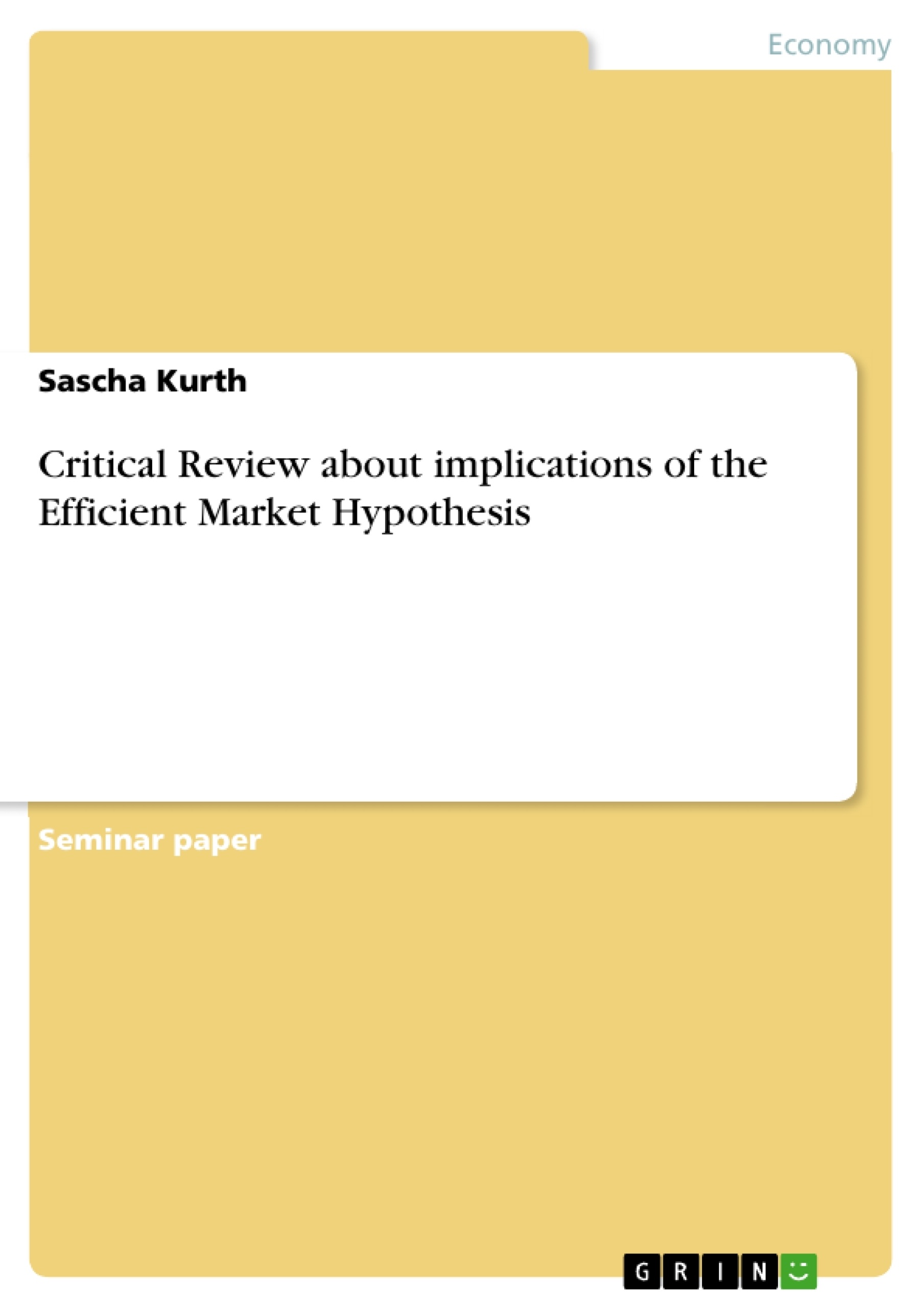The study examines and critical reviews the literature for the different implications based on
the three levels of the Efficient Market Hypothesis for investors and company managers. If
the weak form of the EMH holds, the technical analyse is useless, but ninety percent of
traders in London are using it. If the semi-strong-form holds the fundamental analysis, study
of published accounts, search for undervalued companies are useless and investors should be
focus on diversification and avoiding of transaction costs. Furthermore the semi-strong form
would imply for managers, that accounting disclosure to deceived shareholders is useless, the
company market value is the best indicator for the company value and management decisions,
the company does not need specialists for the timing of issues and there are no opportunities
for a cheap acquisition of another company. At least if the strong-form of the EMH holds, it
would imply that even with insider information it would not be possible to get above average
returns. The literature shows, that the studies of EMH have made an important contribution to
our understanding of the security market. It also shows that in some cases scientific results do
not strong influence the behaviour of manager and investors in the “real world”.
Table of Contents
- LIST OF ABBREVIATIONS
- LIST OF FIGURE
- EXECUTIVE SUMMARY
- 1. INTRODUCTION
- 2. EFFICIENT MARKET HYPOTHESIS...
- 2.1 MARKET EFFICIENCY
- 2.2 THREE LEVELS OF EFFICIENT MARKETS
- 2.3 MYTH ABOUT THE EMH
- 3. INFORMATION ABOUT EMPIRICAL RESULTS.
- 4. IMPLICATIONS OF THE EMH FOR INVESTORS
- 4.1 WHEN THE WEAK-FORM OF THE EMH HOLDS
- 4.1.1 Technical Analysis is useless
- 4.2 WHEN THE SEMI-STRONG-FORM OF THE EMH HOLDS
- 4.2.1 Fundamental Analysis is useless.......
- 4.2.2 The study of published accounts is useless
- 4.2.3 The most tips are worthless..\n
- 4.2.4 The search for undervalued companies is useless
- 4.2.5 Portfolio diversification is important to reduce non-systematic risk.
- 4.2.6 Transaction costs should be as low as possible.
- 4.2.7 Unit Trusts do not perform better than their beta..\n
- 4.3 WHEN THE STRONG-FROM OF THE EMH HOLDS
- 4.3.1 Insider information are useless..........\n
- 5. IMPLICATIONS OF THE EMH FOR MANAGER.
- 5.1 ACCOUNTING DISCLOSURE TO DECEIVED SHAREHOLDERS IS USELESS
- 5.2 MARKET VALUE AS INDICATOR FOR COMPANY VALUE AND MANAGEMENT DECISIONS
- 5.3 COMPANIES DO NOT NEED SPECIALISTS FOR THE TIMING OF NEW ISSUES
- 5.4 THERE ARE NO OPPORTUNITIES FOR A CHEAP ACQUISITION
- 6. CONCLUSION
- 7. BIBLIOGRAPHY.
- The implications of the EMH for investors under different levels of market efficiency
- The relevance and effectiveness of technical and fundamental analysis in light of the EMH
- The impact of the EMH on investment strategies, particularly portfolio diversification and transaction costs
- The implications of the EMH for company management, including accounting disclosure, market value assessment, and acquisition strategies
- The challenges of applying theoretical EMH concepts to real-world market practices
Objectives and Key Themes
This study aims to critically analyze and review the various implications of the Efficient Market Hypothesis (EMH) for both investors and company managers. It explores the three levels of market efficiency – weak, semi-strong, and strong – and examines their respective implications in the context of real-world market dynamics.
Chapter Summaries
The study begins with an introduction outlining the historical background of the EMH and its theoretical development. Chapter 2 delves into the concept of market efficiency and its different levels. It explores the implications of each level for investors and managers, examining the validity of various investment and management practices in the context of an efficient market. Chapter 3 provides an overview of empirical results related to the EMH, highlighting the challenges and limitations of empirical testing. The study concludes by highlighting the contributions of the EMH to our understanding of security markets and emphasizing the disconnect between theoretical concepts and real-world market behavior.
Keywords
This study focuses on the Efficient Market Hypothesis (EMH), its different levels, and its implications for investors and company managers. It analyzes the relevance of technical and fundamental analysis, portfolio diversification, transaction costs, accounting disclosure, and market value assessment in an efficient market. The study also touches upon the challenges of applying theoretical EMH concepts to real-world market practices.
- Quote paper
- Sascha Kurth (Author), 2011, Critical Review about implications of the Efficient Market Hypothesis, Munich, GRIN Verlag, https://www.grin.com/document/180788




